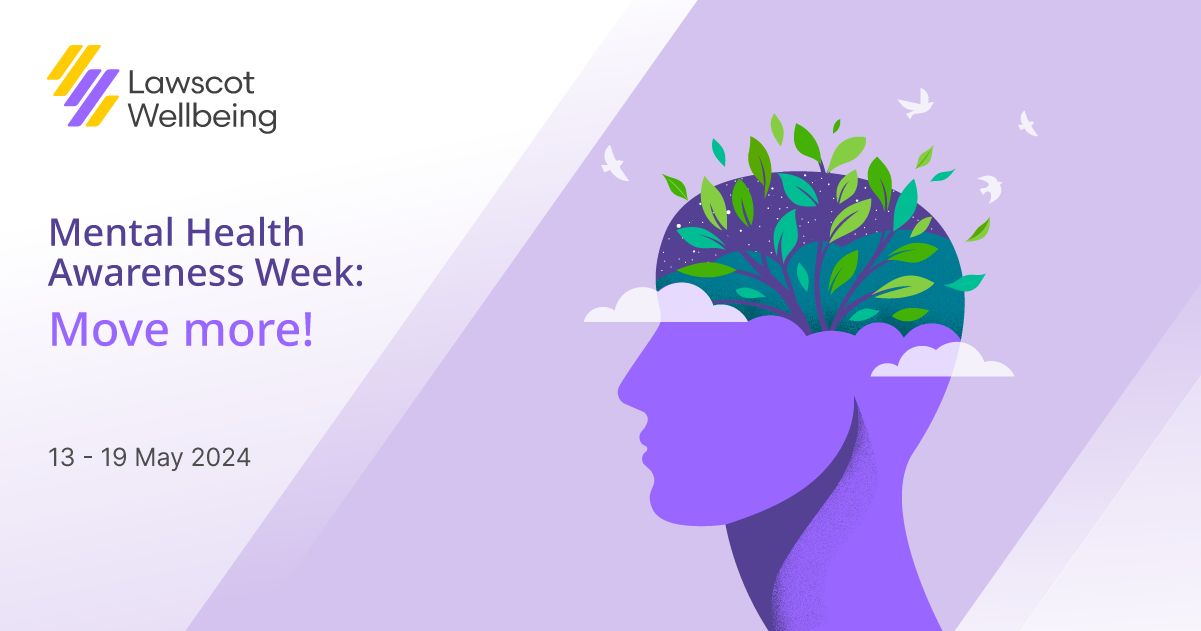Lou Murphy Careers and Wellbeing Manager reflects on the Law Society’s well attended Women in Law event, held last month during Mental Health Awareness Week.
Whilst preparing for our Women in Law session, I had lengthy chats with our Past President Sheila Webster and Lawscot Wellbeing Steering Group members Nicola Rylatt and Laura Meldrum. It was fascinating to explore their journeys, with stories of hormonal health conditions, mental health problems, miscarriage and enforced menopause due to breast cancer. It quickly became clear that the topic was huge and the session we were preparing for needed to be just a starting point for many conversations to raise awareness.
I learned so much throughout the preparation for this session. There was a lot I knew already, but also so many things that came as a surprise. With nearly 57% of the solicitors in Scotland identifying as female (and growing) the feminisation of the profession means that we need to make conversations like these normal and everyday. However, it extends further than ‘in-work’ situations to our friends, family and children; we all need to talk in order to reduce stigma.
Did you know Scotland has a Women’s Health Plan for 2021-2024? A quick survey of the office suggested that not many people do. As I read the plan, my eyes got wider and wider. There are many positive and negative statistics within the document but there were two sections that were most annoying to me.
49% of the young people surveyed have missed an entire day of school because of their period. And 59% of those girls made up a lie or alternative excuse.
In a survey by the British Menopause Society, 45% of women felt menopausal symptoms had a negative impact on their work, many of them suggesting they would not tell their employer the real reason for their absence.
I was annoyed that, whether we are younger or older women, we are seemingly hiding, making up reasons and sometimes outright lying to hide something that is so natural. I was also grateful, as we are incredibly lucky in the Society that we have many women who don’t hide and will speak up. Sheila, Nicola and Laura are three women who will not shy away from a difficult conversation. As part of our preparation, we all agreed that awareness of the challenges was important, while deciding that highlighting key practices that we can all do to support our colleagues was the main aim of the session.
So, here are our key takeaways:
Laura suggested that she did not know if what she was experiencing was “normal” or not, until someone told her it was. Nicola talked about the value of people saying, “I know what you mean” and how just the confirmation that this wasn’t an unusual experience was reassuring.
That being said, any variant of the words “back in my day” are not helpful. When people are experiencing physical or mental health challenges, it is unfair to hold them to anyone’s standard but their own. The individual is the one who needs to set their standard and what is obtainable for them.
Regardless of your gender description, people need to understand that the challenges faced by women are everyone’s problem just the same as other genders. Laura gave as an example how men are impacted by miscarriage as well as women – they experience this loss personally as well as watching a loved one go through the physical hurt and emotional trauma.
Open, honest, and vulnerable are three behaviours that are useful when challenging stigma about any area of life. Setting the tone from the top of your organisation and creating a culture that is psychologically safe will allow people to be their authentic selves and offer the comfort required to disclose any issues.
For leaders, there was an important message. Being vulnerable and sharing your stories can help open doors for others to disclose. Acknowledgement and attendance of knowledge sharing events can encourage others to attend.
However, a word of warning. Words can have a stickiness and stay with people for a long time. A key way to avoid a detrimental impact is to listen, really listen, actively listen! It is important to hear what is being said, and what a person doesn’t say can shout the loudest.
So, be mindful of your words, be approachable, be supportive and be open to having conversations.
Flexible working can be a key tool in supporting people. People may feel able to work, but not necessarily want to be in the office because the strategies that support them are too far away. For example, Nicola suggested a hot water bottle or a tens machine can be used to manage pain, but this is not something you would want to be using in the middle of the office.
Beyond the session itself, the speakers encouraged us all to learn more about the topics that were discussed.
If you are looking for a place to start your research, perhaps read Nicola Rylatt’s blog on Understanding Endometriosis and Adenomyosis and Laura Meldrum’s blog on personal trauma and the workplace.
As for me, the most important lesson I learned whilst organising and listening to this session was there is always more to learn – more research to read, more stories to hear – and that it is important to be open to learning.


